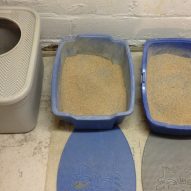The Dangers of Esophageal Foreign Bodies in Dogs
Your dog’s throat The esophagus is a thin sheet of muscle located within the thorax that connects the mouth with the stomach and aids in pushing food and water down into the stomach. Once in a while, if a dog (or rarely, a cat) swallows something too large – or too sharp – for it to pass out of the esophagus, it can become an esophageal foreign body. Esophageal foreign bodies typically get stuck in two locations in the esophagus: near the base of the heart or in the back (i.e., caudal)...
Read MoreMy dog was diagnosed with Heartworm: What do I do now?
The American Heartworm Society came out with a fantastic educational handout (below) on what your veterinarian will do to treat your dog… and what you will need to do! Heartworm Treatment Guidelines for Pet Owners The American Heartworm Society recommends the following heartworm treatment protocol for dogs. This method effectively eliminates most heartworm infections when closely followed by both you and your veterinarian. The overall goals of treatment are to safely and successfully...
Read MoreHow often do I really need to clean my cat’s kitty litter box?
How often do I really need to clean my cat’s kitty litter box? I’m a huge advocate of having lots of kitty litter boxes in the house. In general, the rule is to have n+1 litter boxes (e.g., if you have 2 cats, you should have 3 litter boxes). However, this doesn’t mean you can clean less frequently! We neurotic types clean litter boxes daily. If that’s too much for you, litter boxes should be scooped out at least every other day. Of course, this depends on how many cats you...
Read MoreWhat type of kitty litter should I buy for my cat? | Dr. Justine Lee
Does it really matter what type of kitty litter you buy? We’re bombarded by pet store advertising when it comes to what type of litter to use. Basically, it all comes down to personal preference. While living with my vet school housemate, I asked her why she used clay (“Hellooo! Old school!”). She said that’s what she has always used (my roomie was from the 1960s generation, when clay was hip). After being fed up with the smell and mess, I decided to change her litter to...
Read MoreThe Top 5 Cat Toxins | Dr. Justine Lee
Own a cat? Know how to “cat-proof” your house? If you’re not sure if your house is appropriately pet-proof, read on! According to ASPCA Animal Poison Control Center (APCC), some of the most common feline poisons include: Flea and tick medication (e.g., topical spot-on insecticides) Household cleaners (e.g., bleach, surface cleaners, etc.) Human medications (e.g., amphetamines used for ADD/ADHD, antidepressants) Plants (e.g., poisonous lilies, etc.) Human and veterinary pain...
Read MoreRecall of Lactated Ringers Solution (LRS) and 5% Dextrose!
Hospira Issues Voluntary Nationwide Recall Of One Lot Of Lactated Ringers And 5% Dextrose Injection, Usp, 1000 ML, Flexible Containers Due To Mold Contamination July 10, 2014 Hospira, Inc. (NYSE: HSP), announced today it is initiating a voluntary nationwide user-level recall of one lot of Lactated Ringers and 5% Dextrose Injection, USP, 1000 mL, Flexible Container, NDC 0409-7929-09, Lot 35-118-JT, Expiry 1NOV2015 . This action is due to one confirmed customer report where particulate was...
Read More





Recent Comments